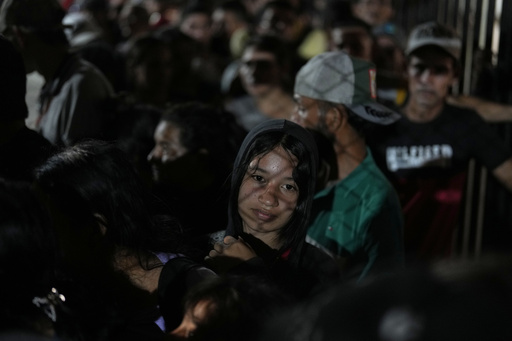BOGOTÁ, Colombia — Over the weekend, more than 80 individuals lost their lives in northeastern Colombia amid a surge of violence following the government’s unsuccessful attempts to negotiate peace talks with the National Liberation Army (ELN), according to a local official.
In addition to the fatalities, approximately 20 others sustained injuries, prompting a mass exodus as thousands fled the violence. The governor of North Santander, William Villamizar, indicated that the military was actively working on rescue operations on Sunday.
Among those killed was community leader Carmelo Guerrero, along with seven others who were pursuing a peace agreement, as highlighted by a report from a government ombudsman agency released late Saturday.
The attacks spread across several towns in the Catatumbo region, which borders Venezuela, and there were reports of at least three individuals being kidnapped during the conflict linked to the peace talks.
The violence has led thousands to escape the area, with many seeking refuge in the surrounding mountains or at government shelters. “We were caught in the crossfire,” recounted Juan Gutiérrez, who fled to a shelter in Tibú with his family, leaving behind their belongings and animals. “We had no time to grab our things. … I hope the government remembers us. … We are helpless here.”
On Sunday, Colombia’s military successfully rescued numerous individuals, including a family and their pet dog. The dog’s owner used a pack of cold water to keep it cool while being airlifted by helicopter.
Defense Minister Iván Velásquez arrived in Cúcuta on Sunday to conduct security meetings and urged armed groups to disband. “The priority is to save lives and guarantee the security of communities,” he stated, emphasizing the deployment of troops throughout the affected region.
Authorities are preparing to deliver 10 tons of food and hygiene supplies for about 5,000 displaced individuals in Ocaña and Tibú, where many have fled due to the violence. “Catatumbo needs help,” Villamizar said in a public announcement. “Boys, girls, young people, teenagers, and entire families are arriving with nothing, using trucks, motorcycles, and even walking to escape the ongoing conflict.”
The violence erupted shortly after the Colombian government announced the suspension of peace talks with the ELN, marking the second such halt in less than a year. The government has insisted that the ELN halt all assaults and allow humanitarian assistance to enter the strife-torn area.
“Displacement is killing us here in the region,” expressed José Trinidad, a local official from Convención in North Santander. “We’re afraid the crisis will worsen.” He urged insurgent groups to engage in negotiations to spare civilians from additional suffering.
The ELN has been engaged in clashes in Catatumbo with former members of the Revolutionary Armed Forces of Colombia (FARC), a guerrilla organization that disbanded following a 2016 peace agreement with the Colombian government. The two groups are vying for control over a crucial border territory known for its coca leaf cultivation.
In a statement on Saturday, the ELN warned former FARC members that if they continued to assault the local populace, armed conflict would inevitably ensue. The ELN has blamed ex-FARC rebels for several recent killings in the area, including a tragic incident on January 15 that resulted in the deaths of a couple and their nine-month-old infant.
Army commander Gen. Luis Emilio Cardozo Santamaría reported that efforts were underway to reinforce a humanitarian corridor between Tibú and Cúcuta to facilitate safe passage for those fleeing the violence. He also noted the deployment of special troops to urban areas where fear and risk are prevalent.
The ELN has attempted to negotiate a peace agreement with President Gustavo Petro’s administration five times, each time faltering amid ongoing violence. The group’s demands include being recognized as a political rebel entity, a request that has raised concerns among critics regarding safety and stability.




